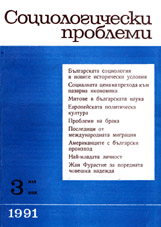Социалната цена на прехода към пазарна икономика
The Social Prize of Transition to Market Economy
Author(s): Atanas Atanassov, I. Kratchunov, V. Pasev, Todor Petev, Sofka Mateeva, S. ZhelevSubject(s): Social Sciences
Published by: Институт по философия и социология при БАН
Summary/Abstract: Based on data from a sociological research carried out in October 1990, the authors analyze the opinions and attitudes of the respondents on the inevitability of the unfavorable phenomena, connected with the transition to market economy, on the degree it affects them and on their ability to endure. The research is representative for the population of Bulgaria over eighteen. 1245 persons have been inquired which com¬prises 99% of the designed sample. According to the respondents three are the unfa¬vorable phenomena, inevitable for the transition to market economy; the social differentiation into rich and poor, the inflation and the unemployment. The peril of job-loss is the phenomenon which has constantly been demonstrated: 44,2% of the respon¬dents who work or worked till recently in different spheres of the national economy consider probable to lose their job; 34,8 % consider they are not endan¬gered with losing their employment; 14,8% are con¬vinced they will become unemployed quite soon; and 6,2 % are already members of the army of the unemp¬loyed. The economic state of the country makes peop¬le think but for the satisfaction of their primary needs —89,2%prefer to spend their money on food, followed by 68 % — on clothes and shoes, the other needs being represented by very low percentage of preference. The majority of the population (57,2%) favours the "distributive justice" (the socially weak people to be least affected) when the burden of the economy crisis is to be distrubuted while 20,6 % favour the "equali¬zation justice" (the burden to be distributed between all strata)and 11,6%—the "market justice"(the market itself to be "distributing" the burden). Nearly half of the respondents (48,4%) consider that transition to market economy requires the com¬mon efforts of all political forces in the country. However, a sizable part of the population (43,7%) still believe a particular political party or a coali¬tion can achieve that (the Union of the Democratic Forces — 26,7%; the Bulgarian Socialist Party — 11,6%; the Bulgarian National Agrarian Union — 3,3 %; and 2,1 % — some other). Obviously the united efforts are considered the peculiar social prize for the political forces to pay, bridging their political interests in the name of the future democracy and the market economy in the country.
Journal: Социологически проблеми
- Issue Year: 23/1991
- Issue No: 3
- Page Range: 25-33
- Page Count: 9
- Language: Bulgarian
- Content File-PDF

